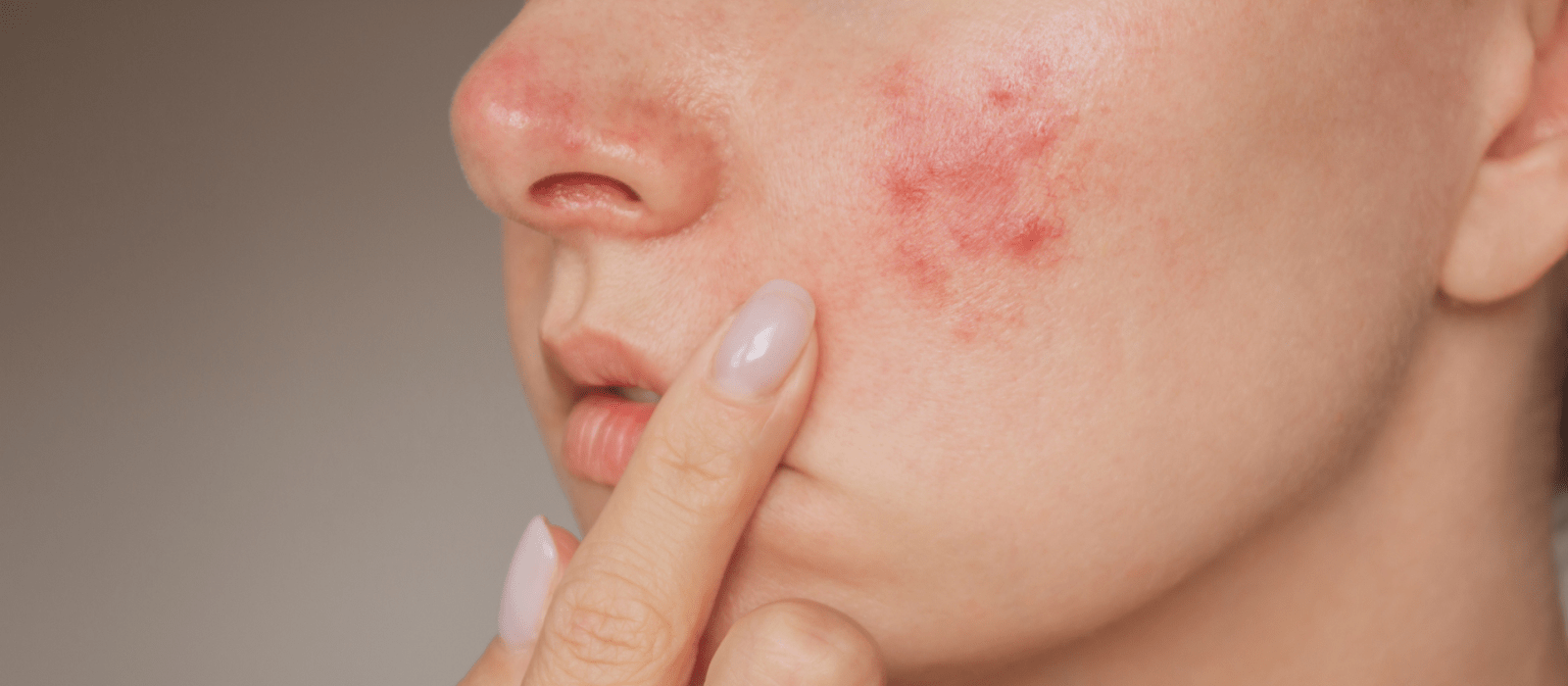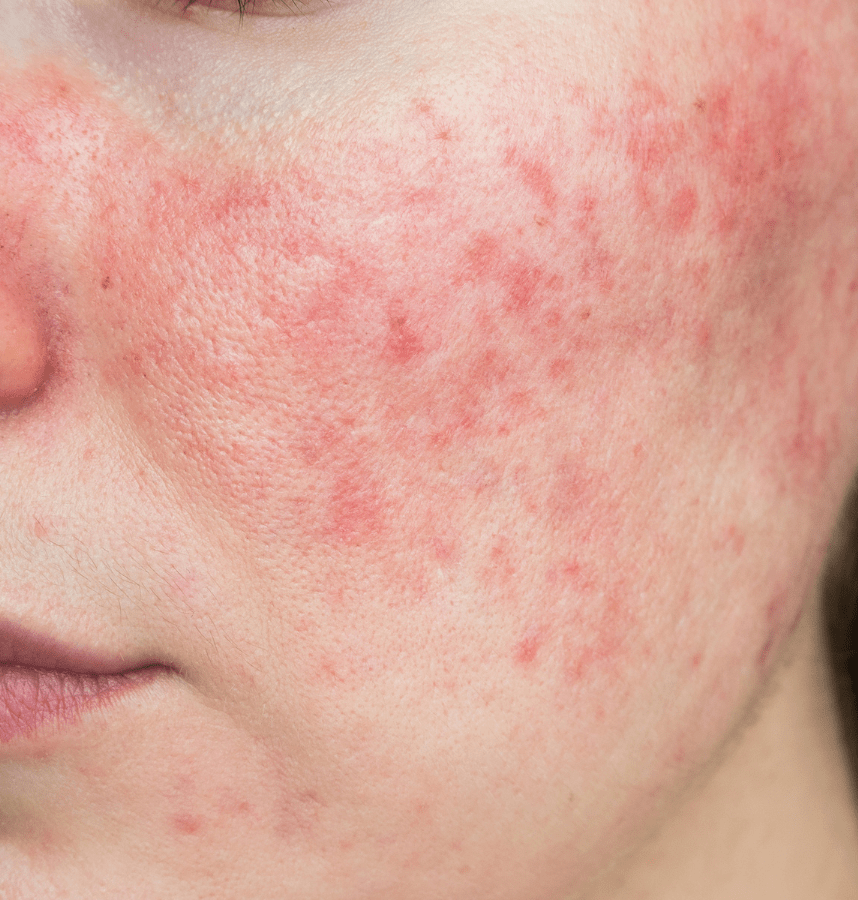About Acne
Acne is one of the most common skin diseases in the United States. Acne most commonly develops during the teenage years and the early 20s, but can also appear later in life. It is caused when the oil gland/hair follicle unit becomes clogged, mostly by an excess production of oil, dead skin cells, and bacteria. Acne comes in many varieties including blackheads, whiteheads and the more severe nodular acne and cystic variants.
CAUSES
Blackheads and white heads begin when a pore in our skin becomes clogged with dead skin cells. Normally, dead skin cells rise to surface of the pore, and the body sheds the cells. When the body starts to increase sebum production (oil that keeps our skin from drying out), the dead skin cells can stick together inside the pore. Instead of rising to the surface, the cells become trapped inside the pore.
Sometimes bacteria that live on our skin, P. Acnes, are also trapped inside clogged pores or the oil gland/ hair follicle unit. When this occurs, the bacteria have a perfect environment for multiplying very quickly. This leads to increased inflammation and pustules, or if the inflammation goes deep into the skin, an acne cyst or nodule appears.
Causes of acne are usually a combination of the following:
• Genetics
• Hormones
• Prescribed medications
• Oil-based cosmetics
• Stress
• Physical irritation
• Humidity and environmental pollutants
Sometimes systemic factors contribute to acne. These conditions can be: pregnancy, medications, underlying systemic medical problems, menstrual or psychological issues. Occupational issues may also play a role in producing acne.
One should not pop, squeeze or pick at acne. This is the most common habit found in acne patients and might worsen common acne, causing cystic lesions, hyperpigmentation or permanent scarring of the skin.
RISK FACTORS
If you have a bad case of acne, you may feel like you are the only one. But many people have acne. It is the most common skin problem in the United States. About 40 to 50 million Americans have acne at any given time.
Although acne is most prevalent in teenagers and young adults, acne can appear at any age. Newborn babies can even get acne.
SYMPTOMS
Acne is not just pimples. A person who has acne can have any of these blemishes:• Blackheads (Open comedones)
• Whiteheads (Closed comedones)
• Papules – Small pink bumps that may be tender to touch
• Pustules – Blockages of the pores and sebaceous glands that have become inflamed
• Cysts – Deep, inflamed, pus-filled lumps
• Nodules – Large, painful, solid lumps that are lodged deep in the skin
• Excessive oil
Acne can cause more than blemishes. Studies show that people who have acne can have:
• Low self-esteem
• Depression
• Dark spots on the skin
• Permanent scars
FAQ
Do you treat acne?
Yes, this is one of the most common skin issues we deal with. We treat acne both medically and aesthetically. A consultation with one of our dermatologists is the first step to determine the best course of action. Acne is not only for teenagers, but can affect any age group.
What is acne?
Acne occurs when pores on your face, neck, chest, back or upper arms get plugged. This typically results in comedones (blackheads and whiteheads). The continuous production of oil by the plugged pore can also result in bacterial overgrowth and inflammation which results in painful acne (pustules or inflammatory cysts).
What acne treatments do you have?
After an initial consultation, we will discuss the best possible treatments which may include oral prescriptions, injections, topical ointments (both prescription and non-prescription) and/or extractions, peels or laser treatments.
How do I know when I need a dermatologist?
Although almost 100% of children between 12 and 17 get some form of acne, you should seek a doctor’s care if you feel any of the below statement fits your situation:
• My acne makes me shy.
• I am embarrassed by my acne.
• My outlook on life is less optimistic since I developed acne.
• None of the over-the-counter products and/or remedies l’ve tried have worked.
• I am beginning to see scars after acne lesions clear.
• I have painful, pus-filled lesions in addition to blackheads and whiteheads and
reddened spots on my skin.
• I have dark skin, and a patch that is darker than my skin appears when an acne lesion
clears.
Can my acne be cured/cleared up?
With new technologies and new products, almost every case of acne can be resolved. In addition, you can work with your dermatologist or aesthetician to develop/create a regime to prevent further outbreaks.
Is acne caused by poor hygiene or diet?
Acne is usually a normal part of adolescence and most teenagers will get some form of acne, but poor hygiene and diet are not direct causes of acne. In most cases, if you vigorously scrub your skin to eliminate excess oils and dead skin, you can further irritate your skin. Numerous studies show there is no direct link between diet and acne; however, eating a balanced diet with plenty of fruits and vegetables is always recommended. If you have adult acne, it is best to consult a dermatologist to determine the cause and the best treatment options.
Is acne treatment just for cosmetic reasons?
No. Although the acne itself poses no threat to a person’s physical health, acne can cause permanent scarring. The appearance of the acne and acne scarring can affect the way a person feels about himself or herself. With significant medical and non-medical advancements, most acne can be cleared up, so it makes sense to explore all options available.
How do you treat acne scars?
We offer several treatment options to reduce the appearance of acne scars. Options for skin resurfacing may include fractional laser skin resurfacing, micro needling, chemical peels, and microdermabrasion.
Visit Virginia Dermatology & Skin Cancer Center
Our team provides thoughtful, expert care for all your general, surgical and cosmetic dermatological needs. We are proud to offer the most advanced dermatological services in Norfolk, Suffolk, Newport News, and surrounding areas.


